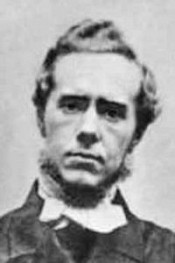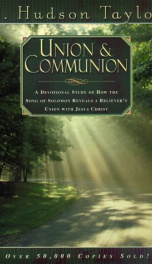Taylor James Hudson

James Hudson Taylor 戴德生 (21 May 1832 – 3 June 1905), was a British Protestant Christian missionary to China, and founder of the China Inland Mission (CIM) (now OMF International). Taylor spent 51 years in China. The society that he began was responsible for bringing over 800 missionaries to the country who began 125 schools[1] and directly resulted in 18,000 Christian conversions, as well as the establishment of more than 300 stations of work with more than 500 local helpers in all eighteen provinces.[2] Taylor was known for his sensitivity to Chinese culture and zeal for evangelism. He adopted wearing native Chinese clothing even though this was rare among missionaries of that time. Under his leadership, the CIM was singularly non-denominational in practice and accepted members from all Protestant groups, including individuals from the working class and single women as well as multinational recruits. Primarily because of the CIM's campaign against the Opium trade, Taylor has been referred to as one of the most significant Europeans to visit China in the 19th Century.[3] Historian Ruth Tucker summarises the theme of his life: Taylor was able to preach in several varieties of Chinese, including Mandarin, Chaozhou, and the Wu dialects of Shanghai and Ningbo. The last of these he knew well enough to help prepare a colloquial edition of the New Testament written in it.[5] Taylor was born in Barnsley, Yorkshire, England, the son of a chemist (pharmacist) and Methodist lay preacher James Taylor and his wife, Amelia (Hudson), but as a young man he moved away from the Christian beliefs of his parents. At seventeen, after reading an evangelistic tract pamphlet[6], he professed faith in Christ, and in December 1849, he committed himself to going to China as a missionary. At this time he came into contact with Dr Edward Cronin of Kensington - one of the members of the first missionary party of the Plymouth Brethren to Baghdad. It is believed that Taylor learnt his faith mission principles from his contact with the Brethren. Taylor was able to borrow a copy of China: Its State and Prospects by Walter Henry Medhurst, which he quickly read. About this time, he began studying the languages of Mandarin, Greek, Hebrew, and Latin. In 1851, he moved to a poor neighborhood in Kingston upon Hull to be a medical assistant with Dr. William Hardey, and began preparing himself for a life of faith and service, devoting himself to the poor and exercising faith that God would provide for his needs. He practiced distributing gospel tracts and open-air preaching among the poor. Again Taylor was in contact with Andrew Jukes, a notable Brethren teacher in Hull. In 1852 he began studying medicine at the Royal London Hospital in Whitechapel, London, as preparation for working in China. The great interest awakened in England about China through the civil war, which was then erroneously supposed to be a mass movement toward Christianity, together with the glowing but exaggerated reports made by Karl Gützlaff concerning China's accessibility, led to the founding of the Chinese Evangelisation Society, to the service of which Hudson Taylor offered himself as their first missionary. Taylor left England on 19 September 1853 before completing his medical studies, arriving in Shanghai, China, on 1 March 1854. The nearly disastrous voyage aboard the clipper "Dumfries" through an Easterly passage near Pulau Buru lasted about five months. In China, he was immediately faced with civil war, throwing his first year there into turmoil. Taylor made 18 preaching tours in the vicinity of Shanghai starting in 1855, and was often poorly received by the people, even though he brought with him medical supplies and skills. He made a decision to adopt the native Chinese clothes and queue (pigtail) with shaven forehead, however, and was then able to gain an audience without creating a disturbance. Previous to this, Taylor realised that wherever he went he was being referred to as a "black devil" because of the overcoat he wore. He distributed thousands of Chinese Gospel tracts and portions of Scripture in and around Shanghai. During his stay in Shanghai, he also adopted and cared for a Chinese boy named Hanban. Scottish evangelist, William Chalmers Burns, of the English Presbyterian Mission began work in Shantou, and for a period Taylor joined him there. After leaving he later found that all of his medical supplies, being stored in Shanghai, had been destroyed by a fire. Then in October 1856, while traveling across China he was robbed of nearly everything he owned. Relocated in Ningbo by 1857, Taylor received a letter from a supportive George Müller which led to Taylor and his co-worker John Jones deciding to resign from the problematic mission board which had sent them, and instead work independently in what came to be called the "Ningpo Mission". Four Chinese men joined them in their work: Ni Yongfa, Feng Ninggui, Wang Laijun, and Qiu Guogui. In 1858, Taylor married Maria Jane Dyer, the orphaned daughter of the Rev. Samuel Dyer of the London Missionary Society, who had been a pioneer missionary to the Chinese in Penang, Malaysia[7]. Hudson met Maria in Ningbo where she lived and worked at a school for girls which was run by one of the first female missionaries to the Chinese, Mary Ann Aldersey. As a married couple the Taylors took care of an adopted boy named Tianxi while living in Ningbo. They had a baby of their own that died late in 1858. Their first surviving child, Grace, was born in 1859. Shortly after she was born, the Taylors took over all of the operations at the hospital in Ningbo that had been run by Dr. William Parker. In a letter to his sister Amelia Hudson Taylor he wrote in 14 February 1860, Because of health problems, in 1860 Taylor decided to return to England for a furlough with his family. The Taylors sailed back to England aboard the tea clipper Jubliee along with their daughter, Grace and a young man,Wang Laijun, from the Bridge Street church in Ningbo, who would help with the Bible translation work that would continue in England. Taylor used his time in England to continue his work, in company with Frederick Foster Gough of the Church Missionary Society translating the New Testament into a Romanised Ningbo dialect for the British and Foreign Bible Society. He completed his diploma (and a course in midwifery) at the Royal London Hospital with the Royal College of Surgeons in 1862, and with Maria's help, wrote a book called China's Spiritual Need and Claims in 1865 which was instrumental in generating sympathy for China and volunteers for the mission field, who began to go out in 1862, the first being James Joseph Meadows. In the book Taylor wrote: He traveled extensively around the British Isles speaking at churches and promoting the needs of China. At home in the East End of London he also ministered at Newgate Prison. During this time he became friends with Charles Haddon Spurgeon, who pastored the Metropolitan Tabernacle and became a life-long supporter of Taylor. Also, the Taylors hosted the young Thomas John Barnardo at their house as a potential missionary candidate between 1865-1866. Their second child, a son, was born in London, Herbert, in 1861. More children were born to the Taylors in 1862 Frederick, in 1864 Samuel, and in 1865 Jane- who died at birth. On 25 June 1865, at Brighton, Taylor definitely dedicated himself to God for the founding of a new society to undertake the evangelisation of the "unreached" inland provinces of China. He founded the China Inland Mission together with William Thomas Berger shortly thereafter. In less than one year, they had accepted 24 missionaries and raised over £2,000 (about £130,000 in 2007 terms ). In early 1866 Taylor published the first edition of the Occasional Paper of the China Inland Mission which later became China's Millions. The following summary by Taylor came to be held as the core values of the CIM in what would come to be a classic description of future faith missions: Character. The Mission is Evangelical, and embraces members of all the leading denominations of Christians. Methods. Methods somewhat unusual and peculiar were adopted for working the newly-proposed organisation. It was determined : 1. That duly qualified candidates for missionary labour should be accepted without restriction as to denomination, provided there was soundness in the faith in all fundamental truths. 2. That all who went out as Missionaries should go in dependence upon God for temporal supplies, with the clear understanding that the Mission did not guarantee any income whatever ; and knowing that, as the Mission would not go into debt, it could only minister to those connected with it as the funds sent in from time to time might allow. Support. The Mission is supported entirely by the free-will offerings of the Lord's people. The needs of the work are laid before God in prayer, no personal solicitations or collections being authorised. No more is expended than is thus received, going into debt being considered inconsistent with the principle of entire dependence upon God.[10] On 26 May 1866, after over five years of working in England, Taylor and family set sail for China with their new missions team "the Lammermuir Party" aboard the tea clipper Lammermuir. A four-month voyage was considered speedy at the time. While in the South China Sea and also the Pacific Ocean the ship was nearly wrecked but survived 2 typhoons. They arrived safely in Shanghai on 30 September 1866. The arrival of the largest party of missionaries ever sent to China - as well as their intent to be dressed in native clothing - gave the foreign settlement in Shanghai much to talk about and some criticism began for the young China Inland Mission. The party donned Chinese clothing, notwithstanding - even the women missionaries - which was deemed semi-scandalous at the time. When other missionaries sought to preserve their British ways, Taylor was convinced that the Gospel would only take root in Chinese soil if missionaries were willing to affirm the culture of the people they were seeking to reach. He argued, from the example of the Apostle Paul, “Let us in everything not sinful become like the Chinese, that by all means we may save some.”
do you like this author?
What readers are saying
What do you think? Write your own comment on this book!
write a commentWhat readers are saying
What do you think? Write your own comment on this author!
write a commentBook list

Separation and Serviceor Thoughts on Numbers VI,VII.
Series:
Unknown
Year:
Unknown
Raiting:
3/5
Show more
add to favoritesadd In favorites

Union And Communionor Thoughts on the Song of Solomon
Series:
Unknown
Year:
Unknown
Raiting:
3/5
Show more
add to favoritesadd In favorites
Book list

Separation and Serviceor Thoughts on Numbers VI,VII.
Series:
Unknown
Year:
Unknown
Raiting:
3/5
Show more
add to favoritesadd In favorites

Union And Communionor Thoughts on the Song of Solomon
Series:
Unknown
Year:
Unknown
Raiting:
3/5
Show more
add to favoritesadd In favorites

Union And Communion
Series:
Unknown
Year:
Unknown
Raiting:
2.5/5
Union And Communion is quite a short book that consists of about one hundred pages but the information presented in it is highly concentrated and useful. J. Hudson Taylor tries to open readers' eyes on God' endless love expressed through Jesus Christ. The Bible is thoroughly analyzed to demonstrate that love constitutes the basis for religion and without it is impossible to imagine a true believer.
Show more
add to favoritesadd In favorites

Separation and Service
Series:
Unknown
Year:
Unknown
Raiting:
4/5
The Kindle edition of J. Hudson Taylor's classic work. Taylor is considered one of the greatest missionaries to serve China; he spent 51 years in the country and is responsible for bringing over 800 missionaries into the country, who, in turned began 125 schools and directly resulted in the conversion of 18,000 people to Christianity. Taylor was known for his sensitivity to Chinese culture and zeal for evangelism. He adopted wearing native Chinese clothing even though this was rare among missionaries of that time.
Show more
add to favoritesadd In favorites

A Ribband of Blue
Series:
Unknown
Year:
Unknown
Raiting:
4.5/5
The Kindle edition of J. Hudson Taylor's classic work. Taylor is considered one of the greatest missionaries to serve China; he spent 51 years in the country and is responsible for bringing over 800 missionaries into the country, who, in turned began 125 schools and directly resulted in the conversion of 18,000 people to Christianity. Taylor was known for his sensitivity to Chinese culture and zeal for evangelism. He adopted wearing native Chinese clothing even though this was rare among missionaries of that time.
Show more
add to favoritesadd In favorites

A Retrospect
Series:
Unknown
Year:
Unknown
Raiting:
3/5
This book was converted from its physical edition to the digital format by a community of volunteers. You may find it for free on the web. Purchase of the Kindle edition includes wireless delivery.
Show more
add to favoritesadd In favorites
What readers are saying
What do you think? Write your own comment on this author!
write a commentif you like Taylor James Hudson try:
readers also enjoyed
What readers are saying
What do you think? Write your own comment on this author!
write a commentGenre
if you like Taylor James Hudson try:
readers also enjoyed
Do you want to read a book that interests you? It’s EASY!
Create an account and send a request for reading to other users on the Webpage of the book!

